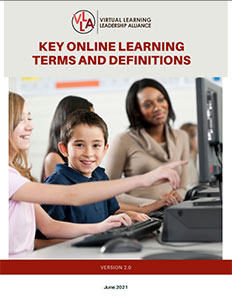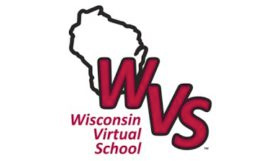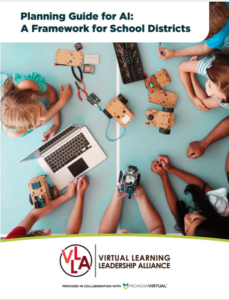Resources from Members of the Virtual Learning Leadership Alliance
The Leadership Alliance members conduct research and generate reports on a number of important topics related to online and blended learning. We hope you will find the following resources useful.
Planning Guide for Artificial Intelligence
The integration of artificial intelligence (AI) has emerged as a powerful practice with the potential to transform teaching, streamline business operations, and personalize learning. However, the successful implementation of AI-driven tools and practices will require careful planning and strategic alignment with a school district’s educational goals, values, and priorities. This planning guide provides educators with practical insights and strategies to navigate the complexities of integrating AI in their districts. This process may be especially challenging for schools over the next few years as AI technology matures and education applications rapidly evolve.
Key Online Learning Terms and Definitions
 The Key Online Learning Terms and Definitions were originally published by the VLLA in 2018. With the onset of the Pandemic requiring schools to move to a form of learning remote, many new terms have become part of our educational systems and vocabulary. In an effort to help clarify and educate districts, parents, and the community on important characteristics and elements that ensure a quality online program, the VLLA members initiated a project to update its Key Online Learning Terms and Definitions. Key Online Learning Terms and Definitions, Version 2.0 includes 51 terms and definitions.
The Key Online Learning Terms and Definitions were originally published by the VLLA in 2018. With the onset of the Pandemic requiring schools to move to a form of learning remote, many new terms have become part of our educational systems and vocabulary. In an effort to help clarify and educate districts, parents, and the community on important characteristics and elements that ensure a quality online program, the VLLA members initiated a project to update its Key Online Learning Terms and Definitions. Key Online Learning Terms and Definitions, Version 2.0 includes 51 terms and definitions.

Ethical Considerations: School Counseling in a Virtual Setting (Part 1) Course: Learn about the legal and ethical issues that can arise when conducting your school counseling program in an online world, both in emergency cases and in regular practice.
Ethical Considerations: School Counseling in a VirtualSetting (Part 2) Course: In Part 2, learn more about the legal and ethical issues that can arise when conducting your school counseling program in an online world, both in emergency cases and in regular practice, and hear the answers to your frequently asked questions.
On demand library of Teaching Strategies for online and hybrid classrooms
Being a successful online student: Website devoted to providing information on how to be successful with communication, managing time, pacing through a course, and taking notes in an online environment.

Mentor Fundamentals: A Guide for Mentoring Online Learners: This publication is intended to provide an understanding of the fundamental elements of mentoring or coaching students for success with online courses
Parent Guide to Online Learning: This guide was prepared for parents, guardians, counselors and others who want to help students decide whether online courses are a good option for them.
Student Guide to Online Learning: This guide was prepared for students to learn about how taking virtual courses is different from taking courses in a traditional face-to-face classroom.
Teacher Guide to Online Learning: This guide supports teachers who are new to teaching online. The guide was written specifically for those who have little or no familiarity with online learning and who are interested in resources to help online learners be more successful.
Administrator Guide to Online Learning: This guide acquaints administrators – including superintendents, principals, curriculum directors, and other district and building-level decision-makers – with online learning.
School Board Guide to Online Learning: This guide acquaints school board members with K-12 online learning.
Distance Learning Options for Districts: The infographic helps districts navigate the transition to distance learning in times of need. Depending on the circumstances and time available for training, there are many different options districts can take to move to a distance learning model. Accessible Version of the infographic
MTDA’s Very Good Online Teaching Framework: The Framework is a series of expectations, best practices, and other recommendations for online teachers to create responsive, flexible and student-driven online courses.
Lab Facilitator’s Guide: Facilitators are essential partners in ensuring student success in online courses.
NC Virtual Scorecard: Created in Tableau, the scorecard is designed to highlight the successful statewide use of NC Virtual Public School. Critical metrics show student performance, our top enrolling districts as well as the most popular courses.
Supporting Online Students Course – This free, self-paced video course is general in nature and is designed for parents, guardians, and mentors of any student who is participating in a blended or online course or is enrolled in a fully online program regardless of school or grade level.
NC Virtual Digital Transition Webinar Series: Our Free Professional Development sessions feature Interactive Conversation Webinars. Join us weekly as we share best practices for supporting students in learning online.

VVA Outreach Program: The Virtual Virginia Outreach Program is designed to assist Virginia public school teachers and students by providing access to online learning modules via the Virtual Virginia learning management system at no cost.
VVA Professional Learning: Virtual Virginia offers online professional learning opportunities for all Virginia public school educators at no cost.
How to Be a Successful Online Student: Website devoted to providing students with steps to be successful in an online course.

Exploring Staffing Models: This report explores four unique staffing models in Wisconsin’s online and blended learning landscape.
A Practical Guide to Learning Analytics: This report will center on the types of data to be collected and how data should be used to inform and enhance successful teaching and learning practices.
Student Support Strategies: This report highlights five student support strategies models in Wisconsin’s online and blended learning landscape.
The Value of Online and Blended Learning: A survey was sent out to the 28 Affiliate and Invested partners of the Wisconsin Digital Learning Collaborative (WDLC) members to collect information that provides a bird’s eye view of what value online and blended learning bring to each program’s learners, instructors, and other stakeholders.
Getting Started with Elementary Online Learning: In order to provide perspectives of what considerations go into planning and implementing an elementary online learning program; WDLC sent surveys to 20 of elementary online learning partners. Partners provided their perspective on basic planning, getting started with implementation, and continuous reflection to guide the creation of this document.




